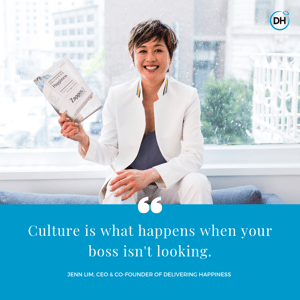
Culture is not just for your employees, it's for anyone who comes into contact with your company - that includes jobs candidates! If you're waiting till the in-person interview to highlight your culture, take a step back and think again. It's critical to make sure you have the right candidates - both as skill and culture fits. So put your culture out there! Here are three things that every applicant should know about your culture [and how to embed them]:
If you look at any career page or job description from a company that prioritizes their culture, you can tell how important it is for each employee to maintain that sense of community and be a part of it. Here are some examples:
If your culture isn’t highlighted on your website or your job postings, start drafting some descriptions up! Ask yourself these three questions to help you get started:
Jot your ideas down and ask a colleague to do the same, and then see what grows out of it!
Hear us on this first; your office space should definitely reflect your culture. When your candidates walk into your office, they should feel your unique culture around them. Your culture, however, is not just about the physical space. It’s about the interactions among employees, customers, and all who come in contact with your business.

In Delivering Happiness the book, our co-founder Tony Hsieh recounts how in the earlier days of Zappos, hiring managers would follow up with their airport/hotel shuttle drivers to see how candidates treated them.
It’s easy to think that culture is confined to space, but truly living the culture is something you take with you anywhere you go. As our CEO Jenn Lim says, “culture is what happens when your boss isn’t looking.”
Questions to think about:
I once interned for a start-up company with a lot of cool perks: free lunches, happy hours, etc. As their venture capital funding was tightening, some of these perks disappeared, and people were becoming very disgruntled. I thought, “if the culture was dependent on free lunches, how adaptable was it really?” Don’t get me wrong; free lunch is awesome. But if your talent is only at the company for the perks, their motivation to stay only goes so far. Thankfully management at the company addressed these changes with honesty and transparency, instead of leaving it to an email notice to deliver the bad news.
So how can you tell the story of your culture in a way that shows how adaptable it is? Talk about it!
Your culture transformed into what it is today and continues to evolve. Share stories about changes you’ve implemented and the results that you’ve seen, even share some hiccups along the way. Some of our clients, like Century 21, have implemented creating Culture Books, which showcase employee reviews of their culture - both good and bad and present different culture initiatives and events that have happened throughout the year.
This sense of transparency will go far in building trust with your candidate and giving them an idea of how invested your company is the betterment of the culture.
After embedding culture into their hiring practices, Canpa's job applicants increased from 60 to 600! Get the full case study:

Bri is the Impact Storyteller on the Delivering Happiness team. Working previously as a freelancer, her goal has always been to work with passionate people who are focused on helping individuals and businesses find their purpose. As part of DH, she now gets to accomplish that every day. Bri resides in Arizona and is lucky enough to enjoy the sun all year round.